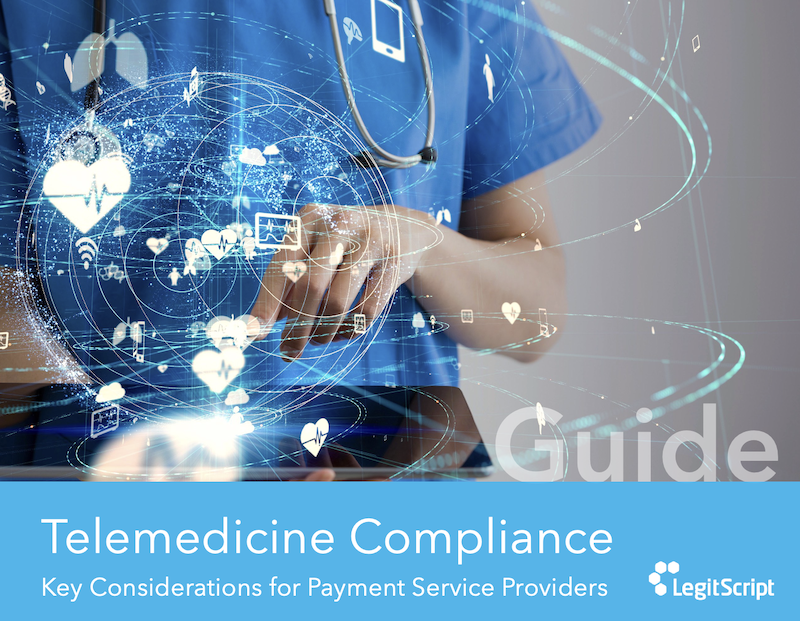As one of the fastest-growing industries, telehealth presents an attractive opportunity for payment service providers looking to grow their merchant portfolios. However, telehealth is also complex and highly regulated, which is why some payment companies have been hesitant to pursue these merchants.
Keep reading to understand some of the key areas of compliance critical to safely onboarding telehealth merchants.

March 11, 2025 | by LegitScript Folks
An Explosive Market
Telehealth, which was a $115 billion market in 2023, is projected to reach as much as $462 billion by 2030. Much of this growth is being driven by upstart healthcare merchants who are offering telemedicine services as a central part of their business. These tech-savvy providers, which operate primarily or exclusively online, are taking advantage of the convenience and discretion offered by online interactions. Patients who may resist discussing sensitive conditions such as erectile dysfunction, hair loss, and mental health issues may feel more comfortable talking about these issues through the internet.
Furthermore, these modern telehealth providers often make use of branding that is contemporary and appealing to dispel the stigma of telemedicine as being stuffy, clunky, or suited only to particular demographics. This reimagined approach is attracting a new, wider customer base.
However, payments companies should be aware of the complications as well. The regulatory landscape for telemedicine is dynamic and differs from state to state. There are common themes across most states, and some consistent situations in which compliance issues are likely to arise. Key areas include licensure, standards of practice, technology requirements, and online questionnaires, which we summarize below.
Licensure Requirements
Most states require the provider to be licensed in the jurisdiction where the patient is located. Telemedicine falls under the practice of medicine, and so providers must be licensed to practice medicine in every jurisdiction where they offer services. Practicing telemedicine in a jurisdiction without a license can result in administrative, civil, or even criminal penalties.
Standards of Practice
Most states regard telemedicine as an extension of the traditional practice of medicine, and require doctors to apply the same standard of care for telemedicine patients that they would for patients they see in-person. For example, a doctor seeing a telemedicine patient for the first time is usually required to confirm the patient’s identity, obtain his/her medical history and other information necessary to make a diagnosis, and provide follow-up care — just like they would do in person.
Technology Requirements
Many states have specific technology requirements for providing telemedicine services. Most laws specify rules around real-time, interactive audio and video, as well as “store-and-forward” technology. Unlike live video, store-and-forward content (also called asynchronous telemedicine) is typically saved as a file and sent to professionals using a secure, encrypted internet connection. Practitioners receive the data and can then analyze it as though it were live.
Online Questionnaires
Most states do not permit the prescribing of medication based solely on an online questionnaire. While many sites emphasize the ease and convenience of obtaining prescription medications via an internet consultation, a merchant that prescribes based solely on an online questionnaire with no consultation is not compliant with telemedicine laws in most jurisdictions. Even if a state’s law does not speak to questionnaires specifically, a static questionnaire would likely be an insufficient basis for a prescription based on standard of care requirements.
Telemedicine Onboarding Questions
Here are some questions that can help determine if a telehealth or telemedicine website deserves a closer look:
- Are its doctors licensed in the states where the website offers to provide services?
- Is the website offering to prescribe drugs solely via telemedicine?
- Is the website offering to prescribe controlled substances solely via telemedicine?
Confidently Onboard Telehealth Merchants With LegitScript
LegitScript Healthcare Merchant Certification is the industry standard for businesses operating in highly regulated healthcare sectors. Recognized by Visa and Mastercard, and trusted by leading payments companies and advertising platforms, Certification helps payment facilitators, ISOs, and acquiring banks onboard and support high-risk healthcare merchants with confidence.
With LegitScript, you can:
- Confidently onboard high-risk pharmacy merchants on your payments platform.
- Ensure high-risk pharmacy merchants are operating in compliance with jurisdictional laws wherever they operate and demonstrate best practices per industry standards.
- Comply with card brand rules, enhance credibility and trust, increase market access, and mitigate risk.
Learn more about LegitScript Healthcare Merchant Certification for Payment Providers.




